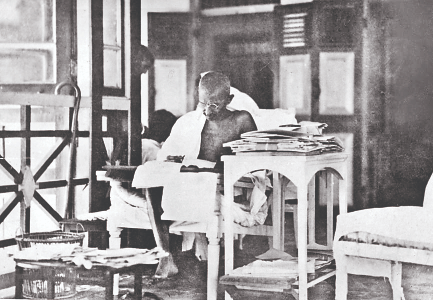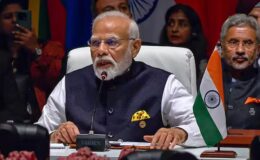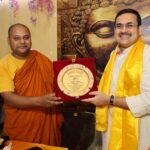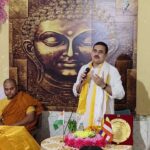If Bapu were to return
- By : Anirban Ganguly
- Category : Articles

If Mahatma Gandhi were to return to India today, two things would attract his attention. One, he would most certainly shower approbation, and another, he would definitely frown and cast opprobrium. The first to attract Bapu and to receive his blessings would be this herculean effort to transform our approach and mindset towards cleanliness and sanitation. Bapu would have showered praises, expressed his solidarity towards Modi’s unceasing effort at trying to alter India’s sanitation landscape. It would have pleased the Mahatma no end to see how the quest for “Swacchta” had produced a youthful, inspired, and a determined brigade of “Swacchagrahis”, volunteers who, imbued with the ideals of a deeper patriotism, came forward and pledged to take ahead the movement for a clean India.
Bapu would have marvelled at how the world is taking note of the effort to clean India. He would have applauded the manner in which it has evolved into a peoples’ movement and drawn the attention of the world. It would fill Bapu with joy to be told that on a certain Independence day the Prime Minister of India openly and frankly spoke of the need to clean India, of the need for sanitation for all and pledged to work for it. Bapu would be reminded of his own words spoken in Banaras a hundred years ago, where he asked his audience how they propose to handle Swaraj if they could not keep their surroundings clean. After all, for him, maintaining and perpetuating freedom was linked to how we preserve and perpetuate a healthy and clean surrounding, how we evolve a consciousness for cleanliness and then enable it to shape our existence.
Bapu would also wonder how even after seven decades of Independence, a majority of children have no access to toilets or clean drinking water, how schools run by governments in Swaraj do not work to provide such basics. He would wonder how the party to which he provided a constructive programme of social reconstruction, has neglected these fundamentals while in power for so long.
But the fact that the world is taking cognisance of India’s effort, that India herself is gradually awakening to action in transforming her mindset towards cleanliness and adopting the mantra of “Swacchata” would have enthused Bapu. The world’s realisation of India’s message of harmonious and assimilative co-existence, of balance between nature and man, of synthesis between development and preservation of nature, the world’s recognition of India’s message of ”environmental consciousness”, of “climate justice”, of the need to evolve and thrive for both these crucial aspects of our collective existence and the future of the earth would also have enthused Bapu, had he not, in his own way, spoken of humanity and of the need to balance and harmonise our collective existence. All of this would have given him hope; it would instilled in him a sense of fulfilment. He would have recognised those who had initiated these efforts as his true spiritual and political heirs.
What would disturb the Mahatma if he revisited India at this juncture and would surely draw his opprobrium is the continued existence of the platform called Congress. Bapu would certainly remember how he had called for dissolving Congress once freedom was achieved. He would recall how, within a few months of Independence, he had been “deeply concerned about the rotting Congress party” and how he had then called for its dissolution and proposed forming in its place, a Lok Seva Sangh. He would remember how he also drew up a constitution for the new body and had decided to place it before the leaders of the party.
It would disturb Bapu to see how his prescient wish remains unfulfilled, how the idea of the Lok Seva Sangh was allowed to lapse and how Congress, over the years, went down the slippery slope, degenerating into an election machine and conglomerate centred around one family. It would further distress him to see how Congress of the freedom movement eventually fragmented and from its ashes rose a perverse body which solely lives to perpetuate a single dynasty. It is a body that is rapacious, politically ruthless, has no sense of sanctity for the real idea of India and which, over the years, has hacked away at our democratic fabric while pretending to be its pre-eminent custodian. It is a body which has increasingly jettisoned ideology and has dumped Bapu’s ideals.
Bapu, thus, would be quite surprised to see how this lethal political entity has reduced him to tokenism without any compunction. It would disturb him no end to see the lowering of the political discourse by the political entity professing to follow his ideas. He would be shocked to hear the language and expressions used, he would be startled and flustered to witness the political vulgarity that his beloved Jawhar’s great-grandson is indulging in today. It would disturb Bapu to see this great-grandson emerge as the symbol of everything that was antithetical to India’s march towards self-reliance, self-sufficiency, and self-recovery, her march towards true “Swadhinata” – Self-dependence. Bapu would perhaps choose to retreat to his favourite Sevagram at Wardha to his quiet corner, to his self-abnegating act of washing his plates but perhaps there, too, would lie in store for him a greater disillusionment: he would see how Jawahar’s dynasty and the pestilential political outfit had reduced his Ashram, its precincts, and its sacred acts into a farce – how at the altar which he had so assiduously built, they are only offering a false and hollow worship.

















